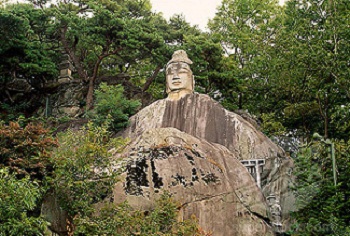Andong Icheondong - Where Awe-Inspiring Giant Buddha Sits
Andong Icheondong in South Korea has become a famous tourist spot as one of the major historic sites.
The awe-inspiring Buddha statue stands on an ancient path staring out over the mountains of the are at Jebiwon which was a rest place for travelers on their way to or from the Sobaek Mountains.
The 2.43-meter-high head of granite Buddha rests on top of a 9.95-meter-high and 7.72-meter-wide stone outcropping engraved with the Buddha's body.
In the earliest days of Buddhism in Korea in the fourth and fifth centuries, the Maiterya Buddha was an inspiration and widely represented throughout the provinces.

During the Goryeo Kingdom, these Maiterya or Mireuk Buddhas were raised at the entrances of mountains and villages. They were made independent of temples and were considered as spiritual landmarks rather than spiritual centers.
The Jebiwon Temple has been built near the statue, so the statue is also known as Jebiwan Seokbul or the stone statue.
The temple took five years to build and the legend has it that on the final day of construction, one of the builders accidentally fell off the roof and died. The worker's soul turned into a swallow and flew away.
THe rest stop was thus named Jebiwon after this legend, since "Jebi" means swallow in Korean.
The Buddha statue, with its distinctive contouring, is in the style of Goryeo (AD 918-1392)Dynasty. This style of outline on a rock indicates that the statue dates from around 11th Century
It was designated National Treasure No.115 on January 21, 1963
There are several fascinating legends associated with the Buddha statue
One local story maintains that a Japanese general during his country's invasion of Korea in the late 16th Century, beheaded the Jebiwon Buddha with his sword.
Another legend is that the Jebiwon stone Buddha gazed across the valley to a pine forest where it saw the Seongju god in the trees. The Jebiwon Buddha told Seongju to enter people's homes to protect them and bless them.
Andong Icheondong Back to Historic Sites





